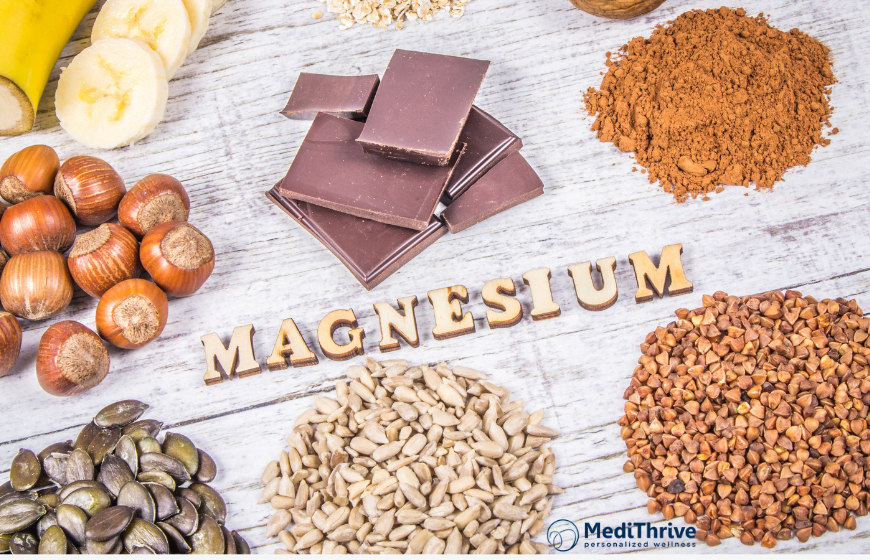When it comes to essential nutrients, magnesium often doesn’t receive the spotlight it deserves. Yet, this vital mineral is involved in over 300 biochemical reactions in the body and is crucial for maintaining overall health. In this blog, our team at MediThrive Personalized Wellness delves into the importance of magnesium, the consequences of deficiency, and how to ensure you’re getting enough of this often-overlooked nutrient. New reports show that almost 90% of the population is deficient in magnesium, underscoring the importance and need of the critical mineral.
What Is Magnesium and Why Is It Important?
Magnesium is a mineral that plays a pivotal role in numerous physiological processes:
- Muscle and Nerve Function: Magnesium helps regulate muscle contractions and nerve impulses, making it essential for both movement and mental health.
- Energy Production: It is involved in the conversion of food into energy, aiding in the production of ATP (adenosine triphosphate), which fuels your cells.
- Bone Health: Magnesium works alongside Calcium, Vitamin D3 and Vitamin K2 to build and maintain strong bones.
- Cardiovascular Health: It supports normal heart rhythm and helps regulate blood pressure.
- Digestive Health: Magnesium aids in the synthesis of proteins and supports digestive enzymes.
- Sleep: Magnesium assists inhibitory neurotransmitters which are responsible for calming the brain, reducing anxiety and promoting relaxation to help people fall asleep.
Given its involvement in so many critical functions, it’s no surprise that maintaining adequate levels of magnesium is crucial for overall well-being.
Symptoms and Consequences of Magnesium Deficiency
Magnesium deficiency can manifest in various ways, and its symptoms can range from mild to severe:
- Muscle Cramps and Spasms: Magnesium helps regulate muscle function, so low levels can lead to cramps and spasms.
- Fatigue and Weakness: Since magnesium is involved in energy production, deficiency can cause persistent fatigue and weakness.
- Mental Health Issues: Low magnesium levels have been linked to symptoms of anxiety, depression, and irritability.
- Bone Health Problems: Chronic magnesium deficiency can contribute to bone density loss and osteoporosis.
- Heart Palpitations: Magnesium helps maintain a healthy heart rhythm; low levels can lead to irregular heartbeats or palpitations.
- Restlessness: Magnesium supports calmness and relaxation; low levels can lead to tossing and turning at night, or not being able to quiet your mind to fall asleep.
Causes of Magnesium Deficiency
Several factors can contribute to magnesium deficiency:
- Inadequate Dietary Intake: Diets low in magnesium-rich foods, such as leafy greens, nuts, seeds, and whole grains, can lead to deficiency.
- Digestive Disorders: Autoimmune conditions like Crohn’s disease or celiac disease can impair magnesium absorption.
- Chronic Stress: High levels of stress can increase magnesium excretion through the urine.
- Medications: Some medications, such as diuretics or certain antibiotics, can affect magnesium levels.
- Alcohol Consumption: Excessive alcohol intake can reduce magnesium absorption and increase its excretion.
How to Ensure Adequate Magnesium Intake
Fortunately, maintaining healthy magnesium levels is often achievable through diet and lifestyle adjustments:
- Incorporate Magnesium-Rich Foods: Include foods high in magnesium in your diet, such as:
- Leafy Greens: Spinach, kale, and Swiss chard.
- Nuts and Seeds: Almonds, sunflower seeds, and pumpkin seeds.
- Whole Grains: Brown rice, quinoa, and oats.
- Legumes: Black beans, chickpeas, and lentils.
- Fish: Salmon and mackerel.
- Consider Supplements: If dietary intake isn’t sufficient or if you have a medical condition affecting absorption, magnesium supplements can be an option. Common forms include magnesium glycinate, magnesium citrate, magnesium threonate, and magnesium oxide.
- Lifestyle Factors: Managing stress and reducing alcohol consumption can help maintain healthy magnesium levels.
- Regular Testing: If you suspect a deficiency or have symptoms related to magnesium imbalance, consider discussing magnesium testing. Testing can help confirm deficiency and guide appropriate treatment.
Conclusion
Magnesium might not always grab the headlines, but its role in maintaining health is far from insignificant. From muscle function and energy production to cardiovascular health and bone strength, magnesium is a crucial component of a well-functioning body. By understanding the importance of this mineral, recognizing the signs of deficiency, and taking steps to ensure adequate intake, you can support your overall health and well-being. If you have concerns about your magnesium levels, don’t hesitate to let our team at MediThrive Personalized Wellness help. Contact us today at (980) 580-6070 or request a consultation today to learn more about how we can support your wellness journey with a personalized plan. It’s your time to thrive!







